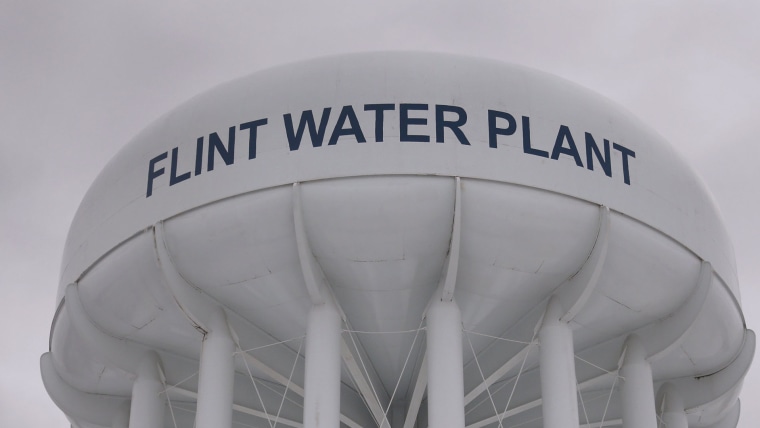Dionna Brown was a freshman in high school when the water crisis in Flint, Michigan, put her community in disarray. Now 23, she vividly remembers the physical and mental ailments suffered by those exposed to hazardous lead.
“My friends that lived on the east side and south side, they had rashes on their skin,” Brown said. “Their hair was falling out.”
Last month a federal judge approved a partial settlement of $626.25 million to compensate as many as 85,000 residents for the problems caused by the water crisis. But even with the money headed toward Flint residents, the health and safety issues related to the water crisis persist in the majority-Black community. Many residents exposed to lead in their tap water developed illnesses like Legionnaires’ disease, miscarriages, behavioral problems in children and male infertility.
According to the preliminary terms of the settlement, 80 percent of the funds will be distributed to those who were 6 or younger at the time of initial exposure to Flint River water. Two percent of the funds will be distributed to special education services in Genesee County, 18 percent will fund property damage and roughly 1 percent will go toward businesses who suffered financial deprivation. The amount each person receives will not be determined until all claims are submitted and found eligible.
While organizations like Black Millennials 4 Flint, which helped the city endure the crisis, are launching a number of initiatives in 2022 to help vulnerable residents, the group’s founder, LaTricea Adams, said that the government settlement is insufficient to support long-term care for those who continue to struggle with health problems.
“This is a slap in the face,” Adams said. “With the settlement, it didn’t take into consideration public health or the social determinants of health. There should have been Medicaid access, Medicare access, for the remainder of people’s lives in Flint. There are irreversible damages done to people in Flint.”
Lynsey Mukomel, press secretary for Michigan Attorney General Dana Nessel, said that lawsuits involving nonsettling defendants may lead to additional funds being distributed.
“We recognize no amount of money will undo the harm created by the crisis, nor the hardship that continues for the city,” Mukomel said. “That said, we were encouraged to see that more than half of Flint’s population registered for the settlement, which was negotiated tenaciously over 18 months to reach a historic outcome. We are proud of this settlement and the positive step it adds to Flint’s healing process.”
Since the water crisis began in 2014, Black Millennials 4 Flint has assisted communities exposed to lead in Flint and other cities across the country, including Baltimore, Washington, D.C., and Memphis. At the peak of the disaster in Flint, members delivered water to homes and advocated against residents having to pay their water bills. While the organization is based in Washington, Adams said it uses Flint in its name to pay homage to the mostly Black individuals who brought the environmental and social injustices to the nation’s attention.
The crisis in Flint stemmed from a drive by the state’s governor at the time, Rick Snyder, to reduce spending in the cash-strapped city by switching its main water source from Detroit Water and Sewage to the Flint River via a pipeline from the Karegnondi Water Authority. Despite reports proving the water to be unsafe, the switch was performed in 2014, exposing residents to water filled with high-risk contaminants. The result was years of health issues for Black residents paired with the failed promise of a boosted economy.
Once a strong industrial city in the early 20th century, Flint began to experience fiscal decline during the 1960s, as manufacturers — and once-reliable factory jobs — left the U.S. and cities like Flint.
Flint is 54 percent Black, and nearly 39 percent of all residents live in poverty, according to the U.S. Census Bureau. The water crisis only exacerbated the city’s economic decline, said Henry Taylor, director of the Center for Urban Studies at the University at Buffalo School of Architecture and Planning.
Decades of neglect and underdevelopment in Flint is a “challenge that we face with African American communities across the country,” Taylor said. For example, the median household income in Flint was only $28,834 in 2019, compared to the national median of $69,560.
The state said it has already spent $423 million to help Flint recover from the crisis, including a $97 million settlement passed in March to replace all of the city’s lead service lines contaminating its water system. However, for cities like Flint to prosper, Taylor said money needs to be invested and recirculated more consciously into the community.
“There’s never been a moment in American history when Black people have not lived in underdeveloped neighborhoods like Flint,” Taylor said. “You got to change the neighborhoods in order to change the other outcomes.”
Meanwhile, local organizations continue to fill the gaps. In Black Millennials 4 Flint’s case, next year the group will launch Lead Free Mamas, a program that will work in conjunction with Revive Community Health Center in Flint to help educate midwives, doulas and social birth workers on how to incorporate environmentalism into their practices.
Brown, whose adolescence is filled with memories of friends and family getting sick from contaminated water, is now actively fighting against such injustices. Inspired by a class she took at Howard University on environmental inequalities, she began working toward solving the water crisis in Flint and other cities and joined Black Millennials 4 Flint after moving back to the city after graduation. Brown is now the national director of the organization’s Youth EJ Griots Program, which engages young Black and Latino leaders to organize against environmental and civil injustices.
The death of Brown’s grandmother from chronic kidney disease provided her with a stark reminder of how the water crisis is still taking a toll on the community, despite the settlement.
“A price tag does not take the place for losing a family member,” Brown said. She said her grandmother was never tested for lead, but Brown remains suspicious. “Even though it happened last year, I can probably see her disease happened from the lead.”
Youth leadership and engagement is a key factor in Black Millennials 4 Flint’s initiatives. Due to the limited job availability and economic decline in the city, many young people are leaving to pursue a college education or for better jobs, Adams said. But the need for continued organizing and activism remains in Flint, even after the final settlement payment is disbursed.
“Lead in drinking water in everyday life is still a problem,” Brown said. “We’re living like a third-world country in a lot of cities because we don’t have any water, the most basic right, and like, access to clean water — and that happens all over the country in Black and brown communities. Nobody says anything. Nobody does anything. So our mission will not change.”
Follow NBCBLK on Facebook, Twitter and Instagram.
Source: | This article originally belongs to Nbcnews.com











